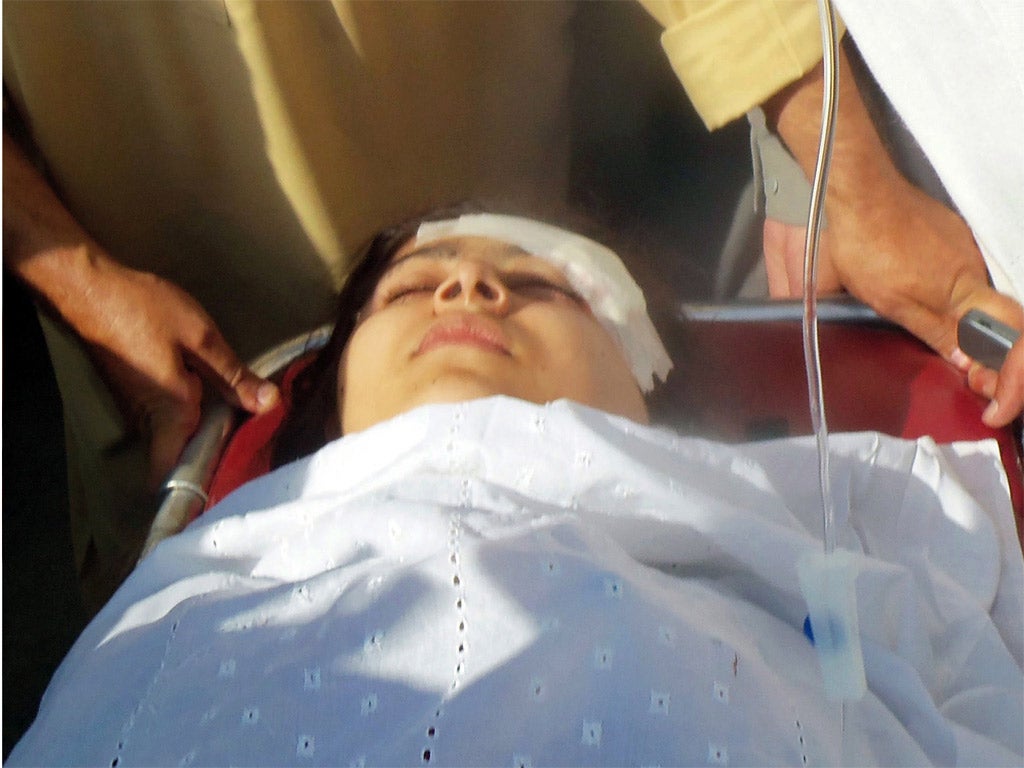Our shock is not enough. Malala's attackers must be brought to justice
By targeting one of the few prominent women’s rights activists, the Taliban sent a chilling message to the people of Pakistan: we are still here and no one is safe.

Sign the petition
I met Malala Yusufzai at Kushal Public School, the school established by her father Ziauddin, after it had just reopened in 2009. The Taliban had finally been pushed out of the Swat valley by the Pakistan Army. “I want to be a doctor,” she said in reply to the inevitable question one asks of schoolchildren. Then she added, “I think girls should have the same opportunities as boys.”
The Taliban’s assassination attempt on schoolgirl Malala has brought unprecedented attention to the threats faced by women’s rights activists in Pakistan. For too long perpetrators of attacks on activists have acted with impunity in Pakistan.
Do not be fooled by Taliban pronouncements that the attempt to kill 14-year-old Malala Yusufzai was an attack on ‘secular ideas’, as a lengthy justification distributed to the media following the shooting explained. By targeting one of the few prominent women’s rights activists, the group was sending a chilling message to the people of Pakistan: we are still here and no one is safe. Not even the media, which has also been subject to threats from the Pakistani Taliban over the coverage of the Malala attack.
On the day I met Malala, other students recalled the terrifying last days before the school closed the previous year and the Taliban swept into the once tranquil mountainous region. They witnessed things no one - let alone children - should ever see. “ Once when I was travelling to school by rickshaw I saw a headless body lying on the side of the road,” one girl recalled. “You could tell the Talibs knew they were in charge. They were roaming the streets freely.”
I first encountered Malala’s father Ziauddin at a makeshift camp for internally displaced people (IDP) in Mardan district, not far from Swat. The war with the Taliban had made him homeless along with millions of others across north-west Pakistan. But he was busy with a group of activists ensuring other displaced families had sufficient food and medicine. Private donations, mostly from ordinary Pakistanis, were the largest source of funding at that time. We sat outside a giant stately home a wealthy local businessman had opened up to families from Swat and began to chat. “Islam teaches us that getting an education is compulsory for every girl, wife, for every woman and man,” he told me with the conviction of someone living by his principles. “ Islam… motivates me to give education to my children because education is a light and ignorance is a darkness. And we must go from darkness into light.”
When I next met Ziauddin later that year he had returned to Swat. He was busy rebuilding the school and, with a group known as the Peace Committee, liaising with authorities to ensure the vast humanitarian needs of returning families were being met. So when friends told me that Malala had been shot I reacted with disbelief. Surely, I thought, after all the challenges and previous threats, such an attack was inconceivable?
Sadly, however, Malala is not the first activist in the tribal areas to be targeted in recent time. In July, Farida Afridi, co-founder of a women’s empowerment NGO, was shot dead as she left her house in Peshawar for work in the morning. One of the few experienced women’s rights campaigners in her community, her death sent shockwaves across civil society.
So too did the killing of Zarteef Afridi in December 2011, a school headmaster and district coordinator for the Human Rights Commission of Pakistan from Khyber Tribal Agency. In a chilling echo of the Taliban justification for the attack on Malala, the al Qaeda-linked Abdullah Azzam brigade said it killed Zarteef Afridi because he was “spreading his ideology through the area”.
A legend within civil society circles, friends told me Zarteef was a modest and compassionate man who had dedicated his life to the social and intellectual uplift of his community, one of the poorest in Pakistan.
Miraculously, Malala appears to have escaped the same fate, but her life has been changed forever. There must now be real social, political and legal reform in Pakistan to prevent what has happened to Malala becoming the norm for people who speak out.
The sad fact is that the Taliban have one plan and one method, which is violence. And it works. It will continue to work, until they are routinely brought to justice. There is a clear pattern in Pakistan- despite the police, the lawyers, judges and prisons, perpetrators of violent crime rarely have their day in court. The government have the opportunity now with this high-profile case, to mark a watershed moment by bringing the people who shot Malala to justice and ushering in a new era where the rule of the gun is no longer tolerated.
Amnesty has launched a new action calling on the Pakistani government to prosecute Malala’s attackers and reform the law and protections www.amnesty.org.uk/malalaJoin our commenting forum
Join thought-provoking conversations, follow other Independent readers and see their replies
Comments
Bookmark popover
Removed from bookmarks